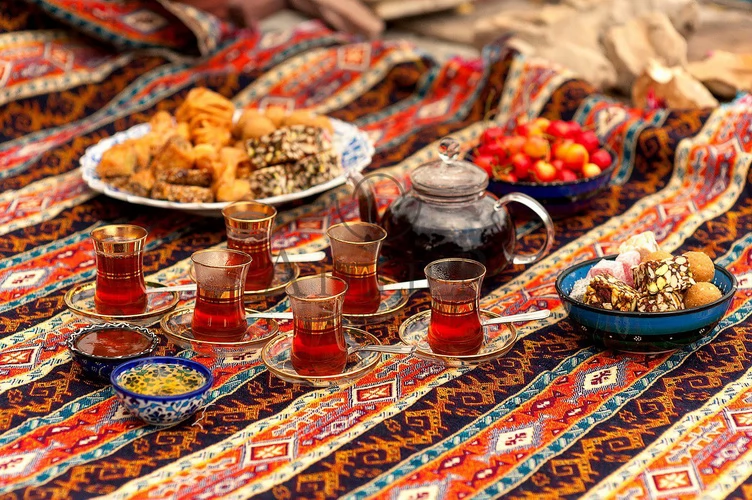Azerbaijan’s tea culture is a rich and integral part of its social fabric, reflecting the country’s hospitality, traditions, and way of life. Here’s an overview of the tea culture in Azerbaijan:
1. Symbol of Hospitality
Tea is more than a beverage in Azerbaijan; it symbolizes hospitality and friendship. Offering tea to guests is a customary practice, often accompanied by sweets, jams, or dried fruits. Serving tea is considered a gesture of goodwill and warmth.
2. The Serving Style
Azerbaijani tea is traditionally served in armudu glasses, which are pear-shaped and designed to keep the tea hot for longer. The shape also allows the tea to cool gradually, enhancing its taste.
3. Tea Accompaniments
Tea is rarely consumed alone. It is typically served with:
- Sugar cubes: Some dip them in tea before taking a sip.
- Jam (such as cherry or quince): Tea is often sipped alongside a spoonful of jam.
- Sweets: Baklava, shekerbura, and other Azerbaijani pastries are common accompaniments.
- Dried fruits and nuts: Adding to the luxurious tea experience.
4. Brewing and Preparation
Azerbaijani tea is brewed strong and often served black. A double-teapot system is used:
- The top teapot brews concentrated tea.
- The bottom pot holds boiling water, which is added to dilute the tea according to individual preference.
5. Tea in Celebrations and Gatherings
Tea is a must-have at weddings, funerals, and other important gatherings. It is also central to matchmaking traditions, where tea is served during the first meetings between families. If tea is served with sugar, it symbolizes agreement; without sugar, it may indicate disagreement.
6. Tea Houses (Çayxanas)
Traditional çayxanas (tea houses) are social hubs in Azerbaijan, especially in rural areas. They serve as places for men to gather, play backgammon, discuss politics, and enjoy a good cup of tea.
7. Regional Variations
Different regions of Azerbaijan have unique traditions:
- In Lankaran, known as the “tea capital” of Azerbaijan, the tea is particularly aromatic and brewed using locally grown leaves.
- Coastal areas may incorporate samovars for brewing, adding a rustic charm to the experience.
8. Health and Spiritual Connection
Azerbaijanis often associate tea with health benefits, including relaxation and aiding digestion. The act of brewing and sharing tea is also seen as a meditative and spiritual practice.
9. Tea and Nature
Many enjoy tea outdoors, whether in a garden, by the Caspian Sea, or in the mountains. This practice enhances the experience and connects people to nature.
Azerbaijani tea culture is a cherished tradition that continues to bring people together, whether through everyday interactions or special occasions. It’s a beautiful reflection of the country’s emphasis on hospitality, community, and warmth.

0 Comment